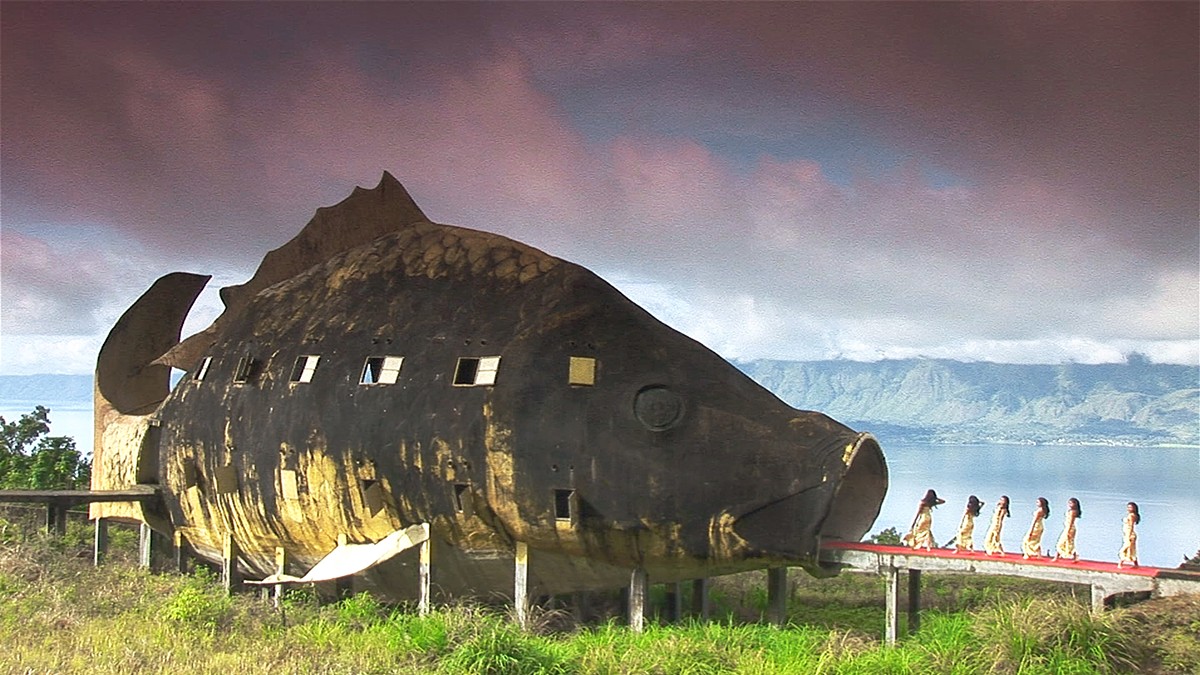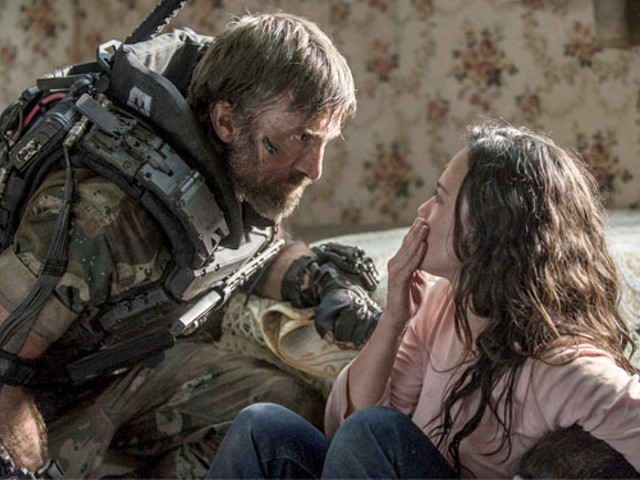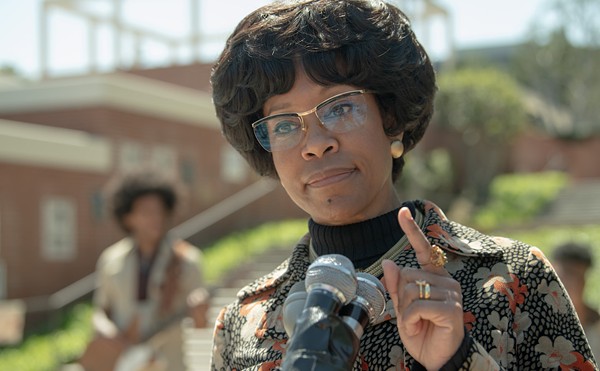Though director Joshua Oppenheimer filmed in the late '00s, the story of The Act of Killing begins in 1965, with General Suharto's overthrow of Indonesia's first post-colonial government and the subsequent purge of ethnic Chinese, Communists, and intellectuals.
To distance itself from the genocide, the government created by the coup turned to Pemuda Pancasila, a paramilitary group, to carry out the executions. Pancasila's members are widely regarded as "gangsters" in Indonesian society, muscle for the government when it operates outside the reach of the law. The Act of Killing takes as its main subject Anwar Congo, a Pancasila member and death squad leader who claims personal responsibility for more than 1,000 of the 1 million dead.
We recently spoke with Oppenheimer.
To what extent do you position this film as an intervention?
That's a really good way of putting it. I began this project in collaboration with a community of survivors. They started by sending me on these missions to meet the perpetrators who they thought killed their relatives, because they didn't know how their loved ones had died. They were taken away, and they never returned. And then as I encountered the perpetrators, they were boasting, they were proud, and I realized it was as though I had walked into Nazi Germany 40 years after the Holocaust, and the Nazis were still in power.
As we continued filming, we were getting stopped by the army, we were being arrested, were having our equipment and tapes taken. I had this feeling: "Should we not do this? Is it too dangerous? Is it too sensitive?" And the Indonesian human rights community, such as they are, and the survivors themselves said, "You must continue. You're onto something. We need a film that unmasks this regime, that exposes the nature of this regime."
I wanted to create a space for people to say the things that they've been to afraid to say yet already know. So in fact, it was precisely a kind of intervention of how a whole regime has told stories to justify what they've done and to build a normality on the basis of terror and lies. I think I never really dared hope that it would make that impact. Maybe I hoped it would make an impact internationally, and then the Indonesians would take notice.
The film challenges the audience to work through and weigh multiple narratives, and even the nature of narrative itself, all at once. Where does that complexity spring from?
The film broadly is about how we tell stories to create our reality, and how as a crucial part of that we tell stories to escape from our most bitter and indigestible truths—the parts of that reality we don't want to face. I think one of the stories we tell—probably the dominant story we tell, all of us—is that the world is divided up into good guys and bad guys. It's the Star Wars story. We tell it again and again, and it underpins almost every story we tell. I think every time we tell it, it's a lie.
The word in Indonesian for "gangster" really does come from [the English for] "free man." [Anwar and his friends are] not just saying that. They fall back on that to justify, to give a kind of slightly heroic nuance to Pemuda Pancasila, this alternative power structure that Indonesian politicians and businessmen and the whole regime uses to do their dirty work.
How do these men justify their crimes?
The tragedy implicit [in this film] is that once you've corrupted yourself, by taking one life through a kind of an original sin, the justification demands further evil. You then have to suppress the survivors so that they don't challenge your version of the story, so that they don't accuse you. That then legitimates stealing their land, shaking them down, extorting them, because you've blamed them for what happened to them. And it demands, most chillingly, that you kill again if called upon. If you don't do it, if you refuse, it's tantamount to admitting it was wrong the first time. There's this downward spiral of evil and corruption ,which creates this terrifying world.
Anwar and his friends approach the re-enactment as a celebration of their deeds. How do you maneuver or maybe reconcile the bald-faced bragging and Anwar's growing guilt over his part in the mass killings?
When I was entrusted by this community of survivors to film these justifications, to film these boastings, I was trying to expose and interrogate the nature of impunity. Boasting about killing was the right material to do that with because it is a symptom of impunity. You can't dance in the place where you've killed 1,000 people if you've been told this was the wrong thing to do. To do that you have to be in utter denial about what you've done. That denial is fed by impunity, and there is an insistence on that denial and a demonstration of impunity at the same time.
Boasting is not a sign of lack of remorse, but its opposite. That's the paradox in the film. Anwar says he's a good dancer because he's drinking and taking drugs and going out dancing to forget. His conscience is there from the beginning. He's desperately trying to escape the real meaning of what he's done, and every re-enactment is an effort to escape the meaning of what he's done, just in the way he used cinema to escape what he'd done at the time of the killings.
The film has had an extraordinary reception in Indonesia and is increasing scrutiny on the regime there. You almost get the sense that the point was a kind of global reckoning rather than just to transform the Indonesian political order.
Every article of clothing touching our bodies is haunted by the suffering of the people who make it for us, all of them working in places where there's been mass violence where perpetrators have won. They have used their victory to create regimes of fear where the people who make everything we buy are so suppressed and their labor so cheap that the human cost of everything we buy is not incorporated in the price that we pay for it.
The Act of Killing is not about a distant killing on the other side of the world. It's about the underbelly of our reality, "brutal underbelly of global capitalism." If the film has any key message that's universal, it's just this: Everybody already knows everything. We know it. Just as Anwar knows what he did was wrong and is trying to run away from it the whole time, and just as Indonesians know this happened. They know their society is a kind of pseudo-democracy built on fear and mass graves.
We know that the lives we live depend on the suffering of others. We depend on Anwar and his friends or men just like them all over the world for our daily living. We all are, in a way, guests at Anwar and his friends' cannibalistic feast. We may not be as close to the slaughter, but we're at the table. And I think this harms us.
We are withdrawing from reality, withdrawing from each other, withdrawing into obsessive egoism, consumerism, and also escapist fantasies that we are like the good guys in the stories that we consume.
What links the political and social fabric of Indonesia to the one here in the States?
[One of the death squad leaders] took me down with a fellow squad leader to the riverbank where he'd helped kill 10,500 people at one spot by just cutting off their heads. After showing me how he went about it with his friend, he pulls out a little camera and asks my sound recordist to take pictures of him and his fellow death squad member posing with the river flowing behind them with the thumbs-up and the V for victory. This was in February 2004.
In April 2004 come the photographs from Abu Ghraib, where American soldiers are giving thumbs-up and V for victory while humiliating and torturing people. The question is not so much about the violence that is documented in the photos, but a much bigger, systemic violence and a cultural, moral, political vacuum in which these snapshots are conceivable as mementos of a happy occasion.
I then made The Act of Killing and the work that led up to it contemporaneously with this evolving nightmare in this country where the greater part of the political establishment was celebrating torture. And just as the perpetrators in the The Act of Killing celebrate mass murder, the celebration I think from the beginning was defensive—if you think the tone of [Dick] Cheney and Rush Limbaugh in fact was defensive.
And it's defensive personally—they're probably trying to convince themselves even as, more frighteningly, they're imposing that on everybody else. And when you're imposing that on everybody else there's a veiled threat.






